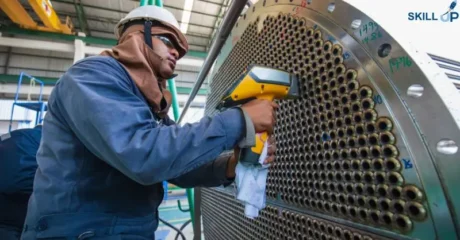 Course Highlights
Course Highlights
What if machines could think, learn, and work without human intervention? Industry 4.0 – Automation & Applications is reshaping industries, making processes faster, smarter, and more efficient. Across the UK and the world, businesses are adopting automation to boost productivity and stay competitive. From manufacturing to healthcare, automation is the driving force behind innovation.
Studies show that automation increases efficiency by up to 40% in various sectors. The demand for skilled professionals in automation and robotics is surging, with industries seeking experts who understand control systems, robotics, and CNC technology. Industry 4.0 – Automation & Applications explores the evolution of automation, ethical concerns, and real-world applications, making it an essential course for those wanting to stay ahead.
With artificial intelligence, robotics, and CNC systems advancing rapidly, understanding automation is no longer optional—it’s a necessity. This course covers everything from industrial robots to 3D printing, offering a deep dive into the future of work. Whether you’re in engineering, IT, or business, this course will equip you with knowledge to navigate the changing landscape of Industry 4.0.
 Learning outcome
Learning outcome
- - Understand the fundamental concepts of automation and Industry 4.0.
- - Identify different types of control systems and their applications.
- - Analyze the role of robotics and AI in automation.
- - Learn about CNC systems, including programming and machine control.
- - Explore ethical considerations and challenges in automation.
- - Understand the significance of 3D printing and its applications.
- - Gain insights into future trends and career opportunities in automation.
 Why should I take this course?
Why should I take this course?
- - Stay ahead in the fast-evolving world of Industry 4.0.
- - Gain in-demand skills in automation, robotics, and control systems.
- - Learn about the ethical and economic impact of automation on businesses.
- - Achieve steady profits and significant career growth.
- - Upon completing this Industry 4.0 – Automation & Applications ,you'll receive a CPD QS Accredited certificate of completion (additional certificate fees apply).
 Requirements
Requirements
- - Basic understanding of technology and engineering concepts.
- - Interest in automation, robotics, and control systems.
- - Willingness to learn and explore Industry 4.0 applications.
 Career Path
Career Path
- - Automation Engineer – £40,000 - £60,000 per year
- - Robotics Technician – £30,000 - £50,000 per year
- - CNC Programmer – £35,000 - £55,000 per year.
- - Industrial Systems Analyst – £45,000 - £70,000 per year
- - 3D Printing Expert – £30,000 - £55,000 per year
Course Curriculum
-
Promo
00:01:00
-
Module 1: Industry 4.0- The Fourth Industrial
00:03:00
-
Module 2: Classification of Automation
00:04:00
-
Module 3: Types of Control Systems
00:05:00
-
Module 4: Ethical Dilemma of Automation
00:04:00
-
Module 5: Robotics & AI – A debatable topic
00:06:00
-
Module 6: Definition of a Robot
00:09:00
-
Module 7: Laws of Robotics
00:02:00
-
Module 8: Components of a Robot
00:07:00
-
Module 9: Robot Classification
00:02:00
-
Module 10: Degree of Freedom
00:08:00
-
Module 11: Robot Configuration
00:05:00
-
Module 12: White Collar Robots
00:04:00
-
Module 13: Numerical Control of Machines Tools
00:04:00
-
Module 14: CNC- Computer Numerical Control Syst.
00:02:00
-
Module 15: Components of CNC System
00:04:00
-
Module 16: Point to Point CNC
00:03:00
-
Module 17: Incremental & Absolute CNC Machines
00:03:00
-
Module 18: Open & Close Control Loop Machines
00:02:00
-
Module 19: 2 & 3 Axes CNC Machines
00:02:00
-
Module 20: Importance of Higher Axes Machining
00:02:00
-
Module 21: Programming Format
00:06:00
-
Module 22: A Simple Coding Exercise
00:17:00
-
Module 23: Applications of CNCs
00:07:00
-
Module 24: General Explanation of 3D Printing
00:06:00
-
Module 25: 3D Printing Procedure
00:02:00
-
Module 26: SLA
00:03:00
-
Module 27: DLP
00:02:00
-
Module 28: Laser Sintering
00:02:00
-
Module 29: FDM
00:02:00
-
Module 30: Inkjet- Binder Jetting
00:02:00
-
Module 31: Inkjet- Material Jetting
00:01:00
-
Module 32: SDL
00:01:00
-
Module 33: EBM
00:01:00
-
Module 34: 3D Printing Material
00:07:00
-
Module 35: 3D Printing Applications
00:12:00
Offer Ends in

-
Duration:2 hours, 33 minutes
-
Access:1 Year
-
Units:36



.png) 7 Reviews
7 Reviews 2 Students
2 Students
 All
Courses for £49
All
Courses for £49


